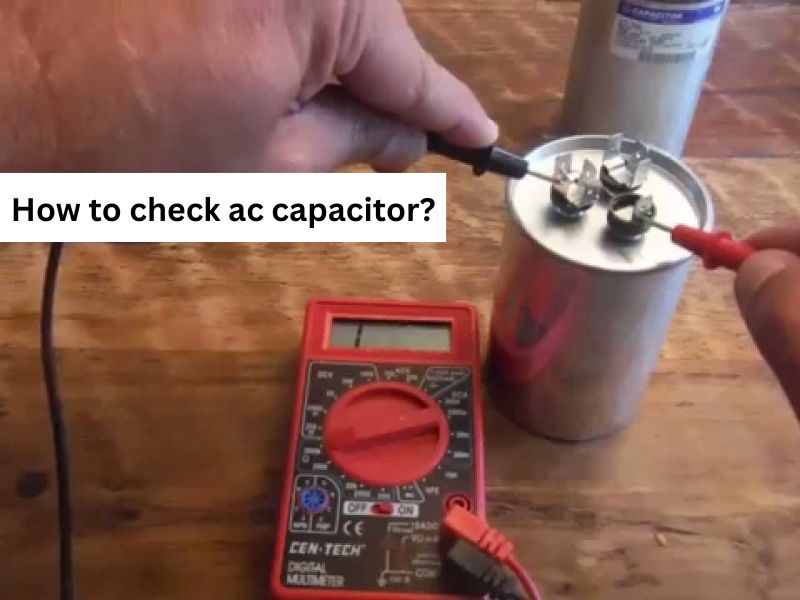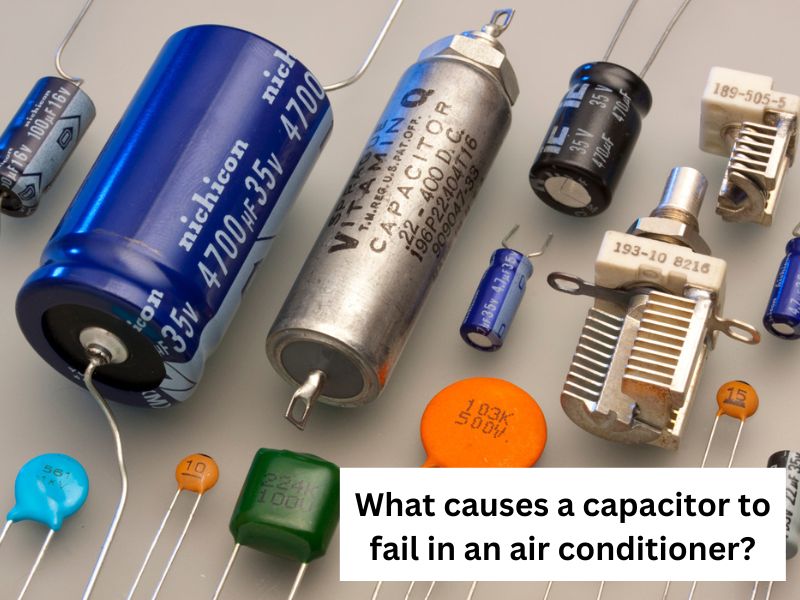If your air conditioner isn’t working as well as it used to, it might be time to check the capacitor. The capacitor is a key component in an air conditioner, and if it’s not working properly, the air conditioner will have to work harder to cool your home. Here are a few signs that your capacitor might be failing:
If you notice your air conditioner is making a humming noise that it didn’t use to make, it could be a sign that the capacitor is failing.
If your air conditioner used to take 15 minutes to cool your home, but now it takes 30 minutes or more, the capacitor might be the problem. Your air conditioner is turning on and off more frequently: If your air conditioner is turning on and off more frequently than it used to, it’s a sign that it’s not running as efficiently as it used to.

Will ac run with a bad capacitor?
A capacitor is an important component in an air conditioner, and if it goes bad, the AC won’t run. The capacitor helps to start the compressor and keep it running. If the capacitor is bad, the compressor won’t start, or it will start and then stop.
A capacitor should be replaced if it is more than five years old or if it is leaking.
How to test ac capacitor?
If your air conditioner isn’t working as well as it used to, one possible issue could be a failed capacitor. In this blog post, we’ll show you how to test your AC capacitor to see if it’s the root of the problem. The capacitor is a key component in your AC unit, providing the power needed to start the compressor.
If the capacitor is damaged or faulty, the compressor won’t start, and your AC won’t work. There are a few different ways to test a capacitor. One is to use a multimeter to test for continuity.
Another is to use a capacitor tester, which is a tool that’s specifically designed for this purpose.
If you don’t have either of these tools, you can try the following:
- Unplug your AC unit and remove the access panel.
- Locate the capacitor. It will look like a cylindrical can and will be connected to two wires.
- Visually inspect the capacitor for any signs of damage, such as leaks, cracks, or bulges.
- If the capacitor looks damaged, it needs to be replaced.
- If the capacitor looks fine, use a screwdriver to disconnect the wires from the terminals.
- Touch the ends of the wires together.
Symptoms of the bad capacitor on air compressor
If your air compressor is having trouble starting up, or if it’s running but not performing as well, as usual, it could be a sign that the capacitor is going bad. The capacitor is a vital component of the air compressor, and if it’s not working properly, the compressor won’t be able to function properly.
Here are some bad ac capacitor symptoms:
- -The air compressor is taking longer than usual to start up.
- -The air compressor is running but not building pressure.
- -The air compressor is making strange noises.
If you notice any of these symptoms, it’s important to take action right away. A bad capacitor can cause serious damage to your air compressor, so it’s best to replace it before it gets too bad. You can find replacement capacitors at most hardware stores, and they’re relatively easy to install.
Just be sure to follow the instructions carefully, and don’t hesitate to ask for help if you’re not sure what you’re doing.
How to tell if a capacitor is bad with a multimeter?

If you suspect that a capacitor in your electronic device is bad, you can use a multimeter to test it. First, set your multimeter to the ohms setting. Then, touch the probes to the leads of the capacitor.
If the capacitor is good, the multimeter should register a low resistance. If the capacitor is bad, the multimeter will register a high resistance or no resistance.
How to check ac capacitor?

To check an AC capacitor, you can follow these steps:
- Turn off power to the AC unit: Before you begin any work on your AC unit, it’s important to turn off the power to the unit to avoid any electrical hazards.
- Locate the capacitor: The capacitor is a small cylindrical object located in the outdoor unit of your AC system. It will have two wires attached to it.
- Discharge the capacitor: To discharge the capacitor, use an insulated screwdriver to short the terminals of the capacitor. This will remove any residual charge from the capacitor and make it safe to handle.
- Check the capacitance: Use a multimeter to check the capacitance of the capacitor. Set the multimeter to measure capacitance and touch the leads of the multimeter to the terminals of the capacitor. The reading should be within 10% of the capacitance rating printed on the side of the capacitor.
- Check for signs of damage: Look for signs of physical damage on the capacitor, such as bulging or leaking. If the capacitor is damaged, it will need to be replaced.
- Check the continuity of the wires: Use a multimeter to check the continuity of the wires connected to the capacitor. Touch one lead of the multimeter to one wire and the other lead to the other wire. The reading should be zero if the wires are intact.
How to replace ac capacitor?
If your air conditioner is having trouble starting up, it might be time to replace the AC capacitor. This is a relatively easy repair that you can do yourself, and it will only take a few minutes. Here’s what you need to know about replacing an AC capacitor.
The AC capacitor is a small, cylindrical component that helps the air conditioner start-up by providing a boost of energy.
Over time, the capacitor can become worn out and no longer able to provide this boost, which is why it needs to be replaced. To replace the AC capacitor, you’ll need a new capacitor (you can find these at any hardware store), a Phillips head screwdriver, and a flat head screwdriver.
First, locate the old capacitor and remove it by unscrewing the two screws that hold it in place. Then, take the new capacitor and screw it in place. Finally, use the Phillips head screwdriver to tighten the screws.
That’s all there is to it! Replacing an AC capacitor is a quick and easy repair that you can do yourself.
What causes a capacitor to fail in an air conditioner?

There are several reasons why a capacitor in an air conditioner may fail:
- Age: Capacitors have a limited lifespan, and over time, they can wear out and fail.
- Overheating: If the capacitor is exposed to high temperatures for an extended period of time, it can become damaged and fail.
- Voltage fluctuations: If the voltage to the capacitor is too high or too low, it can cause the capacitor to fail.
- Electrical surges: Lightning strikes or power surges can damage the capacitor and cause it to fail.
- Dirt and debris: If the capacitor is exposed to dirt and debris, it can become dirty and clogged, leading to failure.
- Moisture: If moisture gets inside the capacitor, it can damage the internal components and cause it to fail.
- Overuse: If the air conditioner is used heavily or runs for long periods of time, it can put a strain on the capacitor and cause it to fail.
What causes a blown ac capacitor
If your air conditioner suddenly stops working, it may be due to a blown capacitor. The capacitor is a small component in the AC unit that helps start the compressor. When the capacitor fails, it can cause the compressor to overheat and eventually fail.
Several things can cause a capacitor to fail, including age, corrosion, and voltage spikes. If your AC unit is older, it’s more likely that the capacitor will fail due to age. Corrosion can also cause the capacitor to fail.
This is more likely to happen if the unit is not properly maintained. Voltage spikes can damage the capacitor and cause it to fail.
Bad compressor or capacitor
If your air conditioner is having trouble starting up, it may be due to a bad compressor or capacitor. The compressor is the heart of the air conditioner, and the capacitor helps start the compressor. If either of these parts is bad, the air conditioner will not work.
If you think your air conditioner may have a bad compressor or capacitor, the best thing to do is call a professional. They will be able to diagnose the problem and replace the part if necessary.
Check Your Bad ac capacitor

If your air conditioner is having trouble starting up, it may be due to a bad capacitor. The capacitor is a small, cylindrical component that helps the AC unit start-up by providing a boost of energy. Over time, the capacitor can become worn out and no longer able to perform its job properly.
If this happens, you’ll need to replace the capacitor. Replacing a capacitor is a relatively simple job, but it’s important to make sure that you buy the correct replacement. The capacitor must have the same voltage and capacitance as the original.
Once you have the new capacitor, simply remove the old one and solder the new one in its place. If your AC unit is having starting problems, it’s worth checking the capacitor to see if it’s the cause. Replacing a bad capacitor is a quick and easy fix that can get your AC unit up and running again.
Will the AC fan run if the capacitor is bad?
If the capacitor is bad, the AC fan will not run. The capacitor is responsible for providing the necessary power to the AC fan motor. If the capacitor is not working properly, the AC fan will not be able to start and will not be able to run.
How do you test AC capacitors?
If your air conditioner is having trouble starting up, it may be due to a faulty capacitor. The capacitor is responsible for providing the initial power boost to the motor, so if it’s not working properly, the motor won’t be able to start. To test your AC capacitor, you’ll need a multimeter.
First, locate the capacitor. It will be a small, cylindrical object, usually with two wires coming out of it. Once you’ve found it, disconnect the wires from the terminals.
Then, set your multimeter to the “capacitance” setting and touch the probes to the terminals. If the reading is below 30 microfarads, the capacitor is most likely defective and will need to be replaced.
How to tell if an AC Capacitor is Bad! Visual and Multimeter Testing!
Conclusion
If your air conditioner isn’t working as well as it should be, it might be because the capacitor is bad. The capacitor is responsible for providing power to the air conditioner’s compressor and fan. If it’s not working properly, the air conditioner won’t be able to cool your home as efficiently.
There are a few signs that your capacitor might be going bad. If your air conditioner is making a humming noise, that’s one sign. Another is if the air conditioner is turning on and off more frequently than usual.
If you notice either of these things, it’s a good idea to call a technician to come and take a look.